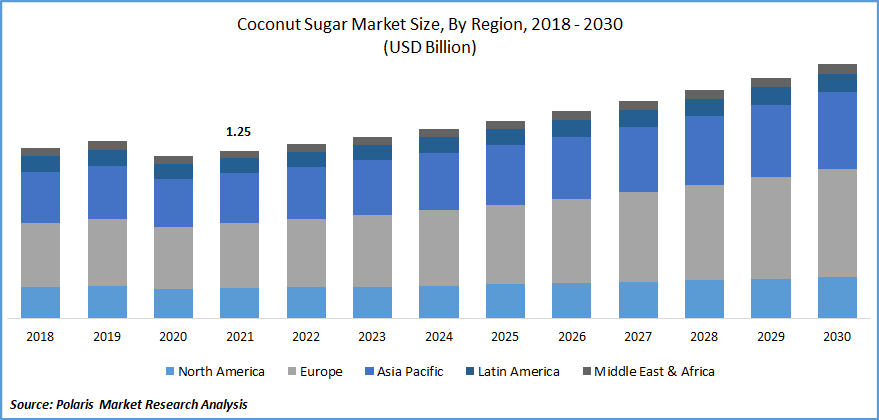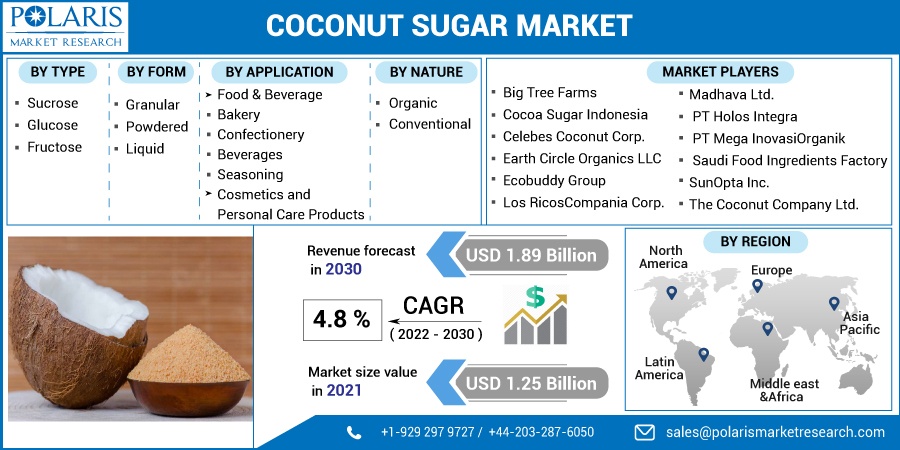
Coconut Sugar Market Share, Size, Trends, Industry Analysis Report, By Type (Sucrose, Glucose, Fructose); By Form; By Application; By Nature; By Region; Segment Forecast, 2022 - 2030
- Published Date:Jul-2022
- Pages: 113
- Format: PDF
- Report ID: PM1266
- Base Year: 2021
- Historical Data: 2018-2020
Report Outlook
The global coconut sugar market was valued at USD 1.25 billion in 2021 and is expected to grow at a CAGR of 4.8% during the forecast period. The market is expanding as a result of the increasing use of coconut sweeteners as alternatives to white sugar in beverages such as tea, coffee, and juices. Additionally, it has a lower glycemic index than cane sugar and honey and is eaten over a longer period during production, both of which are significant factors influencing the industry growth.

Know more about this report: Request for sample pages
They are also called coconut palm sugar, which is a type of natural sweetener that is made from the sap of dried and boiled coconut palm flower buds. Southeast Asia has historically utilized this sweetener as a common sweetener. It is a healthy natural sweetener since it has no fat and is a great source of potassium, magnesium, zinc, and 16 essential amino acids, which has attracted a lot of customer interest.
Additionally, because they have a lower glycemic index than ordinary white sweeteners, consumers demand them. This has encouraged producers to begin using coconut sweeteners rather than conventional sugar to meet consumer demand and give them healthier food options.
The COVID-19 epidemic increased the level of financial uncertainty on the planet and set the stage for severe challenges in a variety of business transactions across the majority of its areas. However, the use of such sweeteners certainly increased as a result of consumers' increased attention to hygiene and safety during the incident.
Although it has only just become widely accessible in the UK, such sweeteners are expanding in popularity, in part due to the increased demand for other coconut-derived goods. In the assumption that they are healthier, more people are already choosing substitutes for white sweeteners such as honey, syrups, and nectars (like date or agave). Thus, the market demand has increased during the pandemic for its health benefits.

Know more about this report: Request for sample pages
Industry Dynamics
Growth Drivers
The anti-aging benefits of the sweetener are driving the industry growth over the forecast period. It is a great anti-aging substance since it contains amino acids, which are crucial for the skin's collagen formation. As per an estimate by United Nations, 22% of the US population will be above the age of 65 years by 2030, with individuals post 75 years of age being the fastest growing subgroup. In 2019, in Japan, people aged 65 years or above held 28% of the total country's population (126 million), followed by it, Italy held 23%.
Further, according to the World Health Organization (WHO), the number of people aged 60 years or above was around 900 million in 2015, and it is estimated to reach nearly 2.0 billion in 2050, with most of the increase in developing countries. The proportion of the population of age 60 years or above between 2015 to 2050 will get doubled from 12% to 22%. By 2050, 80% of the globally elderly will live in low- and middle-income countries.
Thus, the aging population will be doubled by 2050. This indicates that a large number of people will experience skin-related problems related to aging. The businesses that make coconut sugar will take advantage of this as well as the fact that expanding urbanization has increased disposable income. The majority of persons who use coconut sugar as a skincare product are between the ages of 40 and 65.
Report Segmentation
The market is primarily segmented based on form, type, application, nature, and region.
|
By Type |
By Form |
By Application |
By Nature |
By Region |
|
|
|
|
|
Know more about this report: Request for sample pages
Organic sugar is expected to witness the fastest growth
Compared organic to pure sweeteners and nectar, it has a lower glycemic index. It thus reduces the rise in blood sugar levels in the circulatory system. The market is expected to grow during the anticipated period due to factors such as the increased popularity of Asian cuisine, rising demand for dairy alternatives, and potential medical benefits of the market.
Additionally, the market is being driven by the growing prevalence of lactose intolerance among people as a whole and its widespread use in the food and beverage sectors. The market will grow during the anticipated period as demand for organic sweeteners to make products for healthy skin, such as body scrubs, shaving gels, and face and body creams, increases. A distribution of businesses across the majority of global regions.
In comparison to other sweeteners, they contain less fructose. The treatment of coconut palm is mentioned in the organic coconut sugar market. As a result, it is becoming more popular among buyers who are conscious of their health.
The growing demand for organic food products across the globe is anticipated to support the growth of the natural coconut sugar market. Additionally, it is expected that the growing disposable income and shifting dietary preferences of consumers will promote the growth of the organic coconut sugar market segment.
Sucrose sugar accounted for the highest market share in 2021
A natural sweetener made from the sap of coconut blossoms is coconut sugar. The sap is reduced by boiling to get a thick syrup, which is then dried and granulated. About 70% of coconut sugar is sucrose, 20% is glucose, and there are trace amounts of fructose and maltose as well. It has a 35 glycemic index, which is quite a low number.
Simple sugar molecules like glucose can be found in fruits, honey, and some vegetables. The body also makes glucose as a byproduct of the digestion of carbohydrates. Cells in the body require glucose to function properly. To supply the human brain, muscle, and other cells with energy. Additionally, glucose can be retained as glycogen in the muscles and liver.
The cosmetics and Personal Care Segment is expected to hold the significant revenue share
With its rising use as an anti-aging component, coconut sugar consumption will rise commendably across the cosmetics industry. The rise in consumer disposable income has paved the path for greater uptake of skincare products. The rising popularity of face packs and scrubs is a result of growing consumer worries about herbal cosmetic products. The penetration of the product in cosmetics will be fueled by the speeding up of industrialization and the rising levels of air pollution.
The demand in Asia Pacific is expected to witness significant growth
Asia Pacific is predicted to have significant development since Malaysians and Indonesians have long used them as a natural sweeteners. Additionally, Indonesia produces the most coconuts globally, increasing the supply of raw materials.
Additionally, as customers' disposable income has increased, they can purchase the goods for a higher price, which has accelerated the growth of the regional market. Due to the abundance of available raw materials and technological development, Asia Pacific is anticipated to generate the most of the product.
Due to the rising demand on the global market, the product's prices are predicted to rise over the projection period. In comparison to the home market, the price of the product is significantly higher in the global market. As a result, to increase their market share globally, manufacturers must consider prices. Further, because of the rising trends of snacking between meals and increased snack consumption in North America, the market is expected to rise strongly.
The nutritional properties of the food and beverage goods are of greater concern to European customers. Due to the rising percentage of people 65 and older in the population, the age distribution of Europe is predicted to shift significantly over the projection period. Over the projected period, there is expected to be a rise in the prevalence of chronic illnesses among the elderly population, particularly diabetes and heart disease. It is also projected that the rising demand for bio-based cosmetics in the region would create new growth opportunities for the coconut sugar market.
Competitive Insight
Some of the major players operating in the global market include Big Tree Farms, Cocoa Sugar Indonesia, Celebes Coconut Corporation, Earth Circle Organics LLC, Ecobuddy Group, Los RicosCompania Corporation, Madhava Ltd., PT Holos Integra, PT Mega InovasiOrganik, Saudi Food Ingredients Factory, SunOpta Inc., The Coconut Company Ltd., and Tardo Filipinas Incorporated.
Recent Developments
In February 2022, Herza Schokolade introduced its organic chocolates "Inspired by nature." The company saw that there is a significant market for items in the field of "fitness foods" that are manufactured with natural sugars or are "sugar-free."
Coconut Sugar Market Report Scope
|
Report Attributes |
Details |
|
Market size value in 2021 |
USD 1.25 billion |
|
Revenue forecast in 2030 |
USD 1.89 billion |
|
CAGR |
4.8% from 2022 - 2030 |
|
Base year |
2021 |
|
Historical data |
2018 - 2020 |
|
Forecast period |
2022 - 2030 |
|
Quantitative units |
Revenue in USD million/billion and CAGR from 2022 to 2030 |
|
Segments covered |
By Type, By Form, By Application, By Nature, By Region |
|
Regional scope |
North America, Europe, Asia Pacific, Latin America; Middle East & Africa |
|
Key companies |
Big Tree Farms, Cocoa Sugar Indonesia, Celebes Coconut Corporation, Earth Circle Organics LLC, Ecobuddy Group, Los RicosCompania Corporation, Madhava Ltd., PT Holos Integra, PT Mega InovasiOrganik, Saudi Food Ingredients Factory, SunOpta Inc., The Coconut Company Ltd., Tardo Filipinas Incorporated. |
